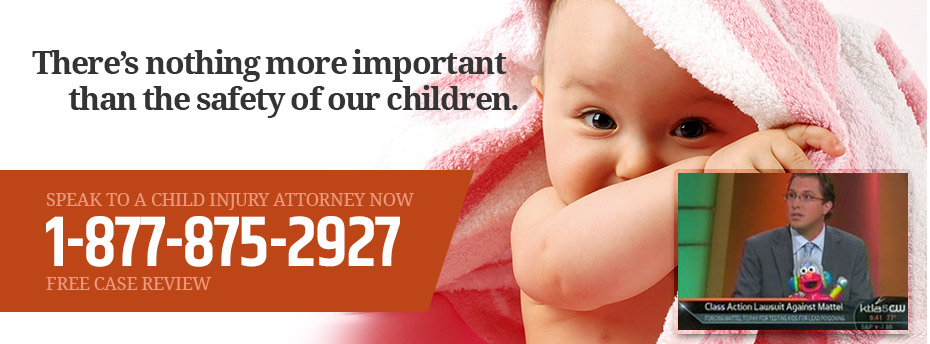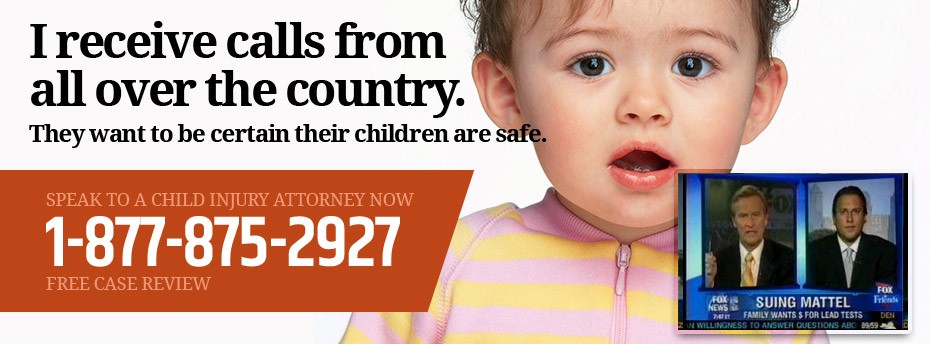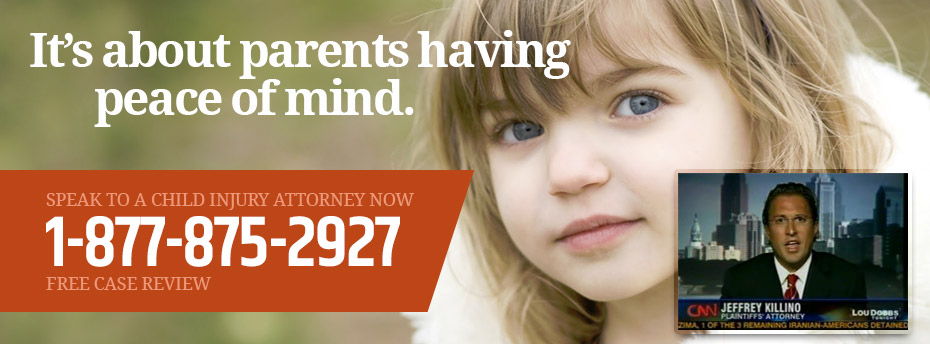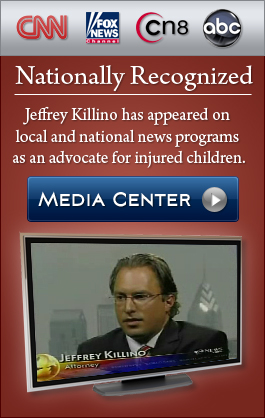From infant teethers and teething rings to homeopathic teething tablets, and over-the-counter benzocaine gels, dozens of products promise to take the discomfort out of teething. But no matter how effectively these remedies soothe aching gums, they aren’t without risks – especially if they’re defective or contain toxic ingredients that could harm a child.
The Killino Firm’s highly experienced Child Injury Lawyers have had great success representing infants and children harmed by defective toys and products, earning national recognition for their aggressive pursuit of justice for the victims of negligent injuries and wrongful death.
If your son or daughter was hurt by an infant teether or other teething product, please call our law firm toll-free at 877-875-2927 to speak with an attorney and learn more about your legal rights.
Infant Teethers and Choking: What Every Parent Needs to Know.
There are lots of infant teethers on the market – including teething rings, teething eggs, and teething pacifiers or binkies. These soothers remain the go-to-solution for the relief of teething pain. And it’s true that the light pressure created when a teething baby chews on toy can provide some relief from tender, painful gums. But Infant teethers that contain beads or small parts that could potentially separate from the teether pose a significant choking hazard. Babies can also choke if a solid, plastic teether breaks into pieces while in their mouths. Even the chewing straws, teething tubes and sticks have had complaints of babies gagging and choking.
Companies that manufacture, distribute, and sell infant teethers must ensure their products are safe for babies and provide prominent warnings about any possible hazards. Parents may be entitled to seek compensation from a personal injury or wrongful death lawsuit anytime the failure to do so results in harm to a child.
Infant Teether Recalls
Unfortunately, some companies do allow poorly designed and defectively manufactured infant teethers to come to market. In fact, the U.S. Consumer Products Safety Commission (CPSC) has announced six recalls since 2007 for teething rings and infant teethers that could cause a child to choke.
Battat Recalls B. toys Firefly Frank Infant Teethers Sold at Target

Most recently, Battat recalled around 61,000 B. toys Firefly Frank Infant Teethers sold exclusively by Target. According to the April 14th recall notice, the company has received 14 reports of the teethers’ wings detaching or pieces of the wing breaking off. One child is known to have chocked on a broken piece of the wing.
The recalled Battat teethers were sold at Target stores nationwide and online at Target.com from July 2019 through February 2021 for about between $6 and $10.The blue, green, and red teethers are shaped like a Firefly and light up when shaken.
Consumers should immediately take the recalled teethers away from young children and return them to any Target store for a full refund, or contact Battat to return by mail for a full refund.
Bonnsu Recalls Miniware Teething Spoons
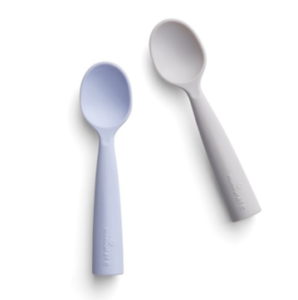
In June 2020, Bonnsu recalled roughly 32,200 Miniware Teething Spoons that can break in a baby’s mouth when being used as a teether.
The recalled Miniware teething spoons are made from food-grade silicone designed for infants to use during the teething phase, approximately 4-24 months of age. The company received one report of an infant who bit through the silicone teething spoon, resulting in a piece separating inside the child’s mouth.
The recalled teething spoons were sold at Miniware.com, Amazon.com, and in stores including Dillard’s, The Tot, Turquoise, The Mellowland, Mom Loves Me, and Bitte nationwide from December 2017 through March 2020 for between $14 and $42.
Consumers should stop using the recalled teething spoons immediately and contact Bonnsu for a free replacement product.
Manhattan Toy Recalls “Manhattan Ball’ Activity Toys
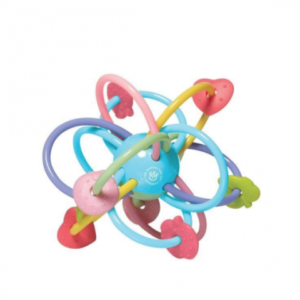
In July 2020, Manhattan Toy recalled more than 22,000 “Manhattan Ball” activity toys because the products’ plastic tubes can detach from the center ball and release small silicone teethers threaded on the tube. The company received six reports of the plastic tubes detaching from the center ball, including two in which the silicone teethers were released. The firm also reported one incident of a child mouthing the silicone teether after it separated from the toy.
The Manhattan Ball was at Target stores nationwide and online at Target.com from July 2019 through June 2020 for about $10. The toy has a hard plastic center ball with 12 soft plastic tubes inserted into the center ball and 7 silicone teethers threaded on the tubes. “The Manhattan Toy Company” and lot code 325700EL or 325700IL are printed on the center ball.
Consumers should immediately take the recalled toy away from children and contact Manhattan Toy or return it to any Target Store for a full refund.
Infantino Recalls Go Gaga Squeeze & Teethe Coco the Monkey

In February 2014, Infantino recalled around 191,00 Go Gaga Squeeze & Teethe Coco the Monkey after seven infants choked or gagged on the monkey’s tail.
This squeaking toy was made of soft orange rubber and shaped like a monkey. “Infantino” was marked on the back toward the rear and model number 206-647 was marked on the inside of the rear left leg. They were sold at Target stores nationwide and online from December 2012 through January 2014 for about $13.
Consumers were warned to immediately take the recalled toy away from infants and contact Infantino to receive a free replacement.
Empire Silver Company Recalls Silver Teething Rings
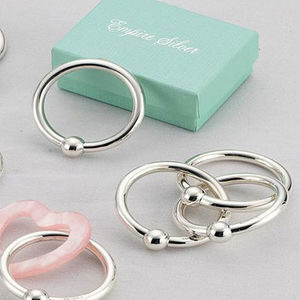
In December 2007, the Empire Silver Company recalled around 1,000 sterling silver teething rings because the silver ball that held the ring in place could separate and release the beads inside.
The teething rings were available in three styles: single ring with ball, single ring with heart and ball, and three rings with ball. The hollow ring had small beads inside that made a rattling sound and a ball soldered between the rings. These defective products were sold at independent jewelry, gift, specialty, and department stores nationwide during November 2007 for between $50 and $120.
Consumers were advised to take the recalled teething rings from infants and return them to the store for a full refund or replacement.
Kids II Inc. Recalls Bright Starts Star Teether Beads and Bright Starts Teether Beads


In January 2007, Kids II Inc. recalled 375,000 Bright Starts Star Teether Beads and Bright Starts Teether Beads following 24 incidents of the beads becoming detached when the teether’s flexible ring broke or cracked.
The Bright Starts Star Teether Beads (model 8483) had textured soft plastic beads in bright colors and various shapes connected to a flexible plastic ring. The beads on this model were shaped as stars, spirals and ovals. The Bright Starts Teether Beads (model 8549) had plastic beads in bright colors that were shaped as an oval and are connected to a flexible plastic ring. The recalled teethers were sold at discount department and juvenile specialty stores nationwide from June 2006 through January 2007 for between $1 and $3.
Parents and caregivers were advised to take the product away from children immediately and contact Kids II for information on receiving a free replacement.
FDA Teething Product Warnings.
Dangerous teething products aren’t limited to defective infant teethers.
Teething Jewelry Hazards

amber beads round fashion accessory decoration isolated on white background
In fact, less than two years ago, the U.S. Food & Drug Administration (FDA) warned that teething jewelry including –bracelets and necklaces made from amber, wood, marble, or silicone – should not be given to infants. The agency’s warning came after a 7-month-old infant choked on the beads of a wooden teething bracelet while under parental supervision. Tragically, an 18-month-old child who was strangled to death by his amber teething necklace during a nap.
Other risks associated with teething jewelry include mouth injuries and infections.
Homeopathic Teething Tablets and Gels
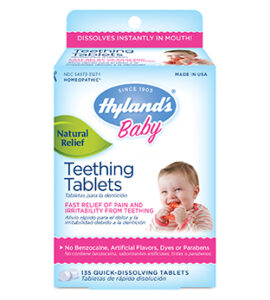
The FDA has issued several warnings about homeopathic teething tablets and gels containing belladonna that could prove toxic to children, resulting in seizures, difficulty breathing, lethargy, excessive sleepiness, muscle weakness, skin flushing, constipation, difficulty urinating, or agitation.
In April 2017, the Standard Homeopathic Company recalled all lots of Hyland’s Baby Teething Tablets and Hyland’s Baby Nighttime Teething Tablets after an FDA laboratory analysis found the products contained inconsistent levels of belladonna.
Benzocaine-Based Teething Remedies
In 2018, the FDA requested that companies stop marketing over-the-counter benzocaine-based teething remedies for use in infants and children. These products were sold as gels, sprays, ointments, solutions, and lozenges under brand names Anbesol, Baby Orajel, Cepacol, Chloraseptic, Hurricaine, Orabase, Orajel, and Topex, as well as store brands and generics.
According to the agency, such products had been associated with methemoglobinemia, a dangerous blood disorder that can lead to serious injury and death.
Help Your Baby Teeth Safely to Prevent Child Choking Injuries
Most babies develop teeth between 6 and 12 months of age. Teething symptoms aren’t the same for every infant, but may include:
- Swollen, tender gums
- Fussiness and crying
- A slightly elevated temperature (less than 101 F)
- Gnawing or wanting to chew on hard things
- Lots of drool that may cause a rash on the face
- Coughing
- Rubbing their cheek or pulling their ear
- Bringing their hands to their mouth
- Changes in eating or sleeping patterns
Teething doesn’t usually make a baby sick. Call your pediatrician if your son or daughter develops diarrhea, vomiting, rashes on the body, a higher fever, or cough and congestion. You should also consult with a doctor if your child’s gums are bleeding or you see any pus or swelling of their face.
To safely relieve your baby’s teething pain:
- Avoid infant teethers made from materials that could break easily, as well as those with small parts that could separate from the teether. Also steer clear of frozen liquid teething rings, as these could injure your child’s gums.
- Sign up for CPSC recall notifications to ensure your baby’s teethers and teething rings haven’t been recalled.
- Try giving your baby a frozen or wet wash cloth to chew on instead of an infant teether.
- Try massaging your infant’s gums with a clean finger.
- Don’t ever offer your child trendy teething jewelry or “bling” made from amber or other materials. Beads and other small pieces can separate from the jewelry and cause an infant to choke. Teething necklaces pose a strangulation hazard, and there’s always a risk that that the jewelry will irritate or pierce a baby’s gums, leading to a serious mouth injury or infection.
- Make sure to closely supervise your child if you offer a teething biscuit, as pieces can break off easily and lead to choking.
- Stay away from teething tablets that contain the plant poison belladonna and over-the-counter remedies with benzocaine. They can cause dangerous side effects.
- If your baby is clearly uncomfortable, ask your pediatrician about giving a weight-appropriate dose of acetaminophen, or if over 6 months, ibuprofen.
Contact an Experienced Child Injury Lawyer Today
As a nationally recognized Child Injury Lawyer, Attorney Jeffrey Killino has successfully handled a wide range of injury and wrongful death cases involving dangerous toys and baby products.
If your baby or toddler was hurt because of defective infant teether or other hazardous teething product, Jeffrey Killino and his legal staff will commit the resources necessary to ensure you family obtains the compensation and justice you deserve. Please don’t hesitate to contact us today at 1-877-875-2927.
